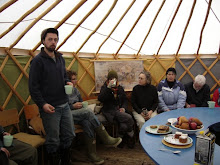When people think about science, they tend to concentrate on how science breaks the world into smaller and smaller categorical and divisible parts, until all the world is is a mass of tiny particles. But what we fail to realize is that at the smallest level of ordered material existence, what defines one atom from another is precisely its capacity to relate. Whether it's the relation between the electrons, neutrons and protons, or the atom's capacity to bond with other atoms, were it not for the capacity to relate (and that potential being realized) there would be no matter, no ordered reality, no existence.
Many of the artists, aesthetics, philosophers and hipsters have inconsistent and confused reactions to my decision to go into the sciences. Perhaps they are turned off by the tacky colourful illustrations, the bourgeoisie-ness of scientific careers, or the assumed materialistic and reductive philosophical tendencies. Perhaps it seems dull and useless as they relive their memories of grade 10 science, their teachers trying to find a way to make cytoplasm and covalent bonds interesting and relevant to the lives of hormonal adolescents. Even I can't seem to talk about my academic career choice without a confused expression. It still seems so far from anything I ever thought I'd love or be. My entire identity is being challenged, and yet the only block seems to be what is a fundamentally social aesthetic that clashes with my artistic upbringing.
But what I realized tonight as I lay in bed trying to defend myself in imaginary conversations, is that science is... well... beautiful. Really beautiful. If we forget what we know about the image of science, and look at it for what it is, we see that it is fundamentally a conversation about Being itself. It is a close observation of Nature, it is an investigation into the relationships that allow existence. It is, in spite of what we think, still what the Greek's referred to it as: natural philosophy.
In my previous defences, I've mentioned how much I enjoy being in an active dialogue with what I'm learning in the sciences. Philosophy started to feel like a game of ping pong that had gone on too long even after Hegel had already clearly won. That's why I decided to go into architecture. I wanted to be involved in a dialogue that questioned how we were really to design our lives, questions that needed answers because they would actually be applied to concrete reality. But I realized a career in architecture would fall short of this desire. The college was full of bizarre and snobby people, and the field would not provide me with the ability to shape our world for the better. If I was going to shape our world for real, I'd need to attack it on a conceptual level first, and I'd have to make my argument convincing. It's of course for more reasons than that that I'm going into science... but that's another... "blog."
I have so many questions, so many ideas, so many hypotheses and such a fascination with life, structure, relation and body. You wouldn't believe how much we don't know, how much we discover every day. It's kind of scary, and yet it inspires a kind of faith to realize how incredibly existence works on its own, whether we know how it does it or not.

No comments:
Post a Comment